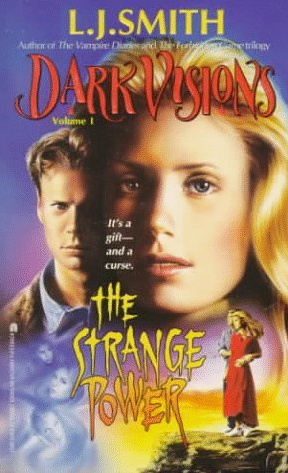

“By the way'[Gabriel] said,' everyone else had better keep out of here. After you spend so much time in lockup, you get to like your space. You get kind of territorial. I wouldn't want anybody to get hurt.' ... Gabriel gave [Kaitlyn] a long, measuring look. Then he flashed a brilliant, unsettling smile. 'You can come in any time you like”
― L.J. Smith, quote from The Strange Power
“Good night, Gabriel.' [Kaitlyn] said
You jerk
[Gabriel] widened his eyes. 'Don't you want to stay? It's a big bed.”
― L.J. Smith, quote from The Strange Power
“Lewis: "Oh, no."
Kaitlyn: "Lewis?"
Lewis: "Hi, Kaitlyn. Hi. Rob."
Rob: "G'way, Lewis. I'm sleeping."
Kaitlyn: "Hi. Anna."
Anna: "Hi, Kait."
Lewis: "Hi, Anna."
Gabriel: "And good night, John-Boy! Shut the hell up, all of you!”
― L.J. Smith, quote from The Strange Power
“Appena la porta si chiuse, Kait disse "Gabriel - come l'arcangelo?". Non riuscì a nascondere l'inflessione pesante di sarcasmo nella propria voce.
La porta si riaprì, e Gabriel la soppesò con un lungo sguardo. Poi fece balenare un luminoso, allarmante sorriso. "Tu puoi entrare ogni volta che vuoi", disse.”
― L.J. Smith, quote from The Strange Power
“E io che c'entro?", disse Gabriel, rilanciando il foglio a Kaitlyn. Era sdraiato sul letto a leggere una rivista di automobili - vetture di lusso. "Non è un problema mio".
Kaitlyn afferrò il foglio a mezz'aria. Aveva dovuto ricorrere a tutto il suo autocontrollo per entrare in quella stanza. Probabilmente non avrebbe dovuto farlo, ma in quel momento non riusciva ad affrontare Rob da sola, e Anna era al telefono con i suoi familiari dall'ora di cena.
Kaitlyn si sforzò di mantenere la calma.
"Se c'è qualcosa di vero in quello che sostiene Marisol, allora è un problema di tutti", disse a Gabriel con fermezza. "E tu sei stato l'unico a dire che qui c'era qualcosa che non andava".
Il ragazzo si strinse nelle spalle. "E allora?".
Kait aveva voglia di urlare. "Tu sei convinto che ci sia qualcosa che non va - ma non t'importa di scoprirlo? Non vuoi fare niente?".
Un accenno di sorriso baleno sulle labbra di Gabriel.
"Certo che voglio fare qualcosa. Farò quello che so fare meglio".
Kaitlyn non voleva dargli soddisfazione, ma non riuscì a nascondere la propria curiosità. Anche se si sentiva ridotta a fare la spalla di un comico, buttò lì la domanda: "E cosa sarebbe?"
"Pensare a me stesso", rispose compiaciuto Gabriel. Gli occhi neri scintillarono di maligna soddisfazione.”
― L.J. Smith, quote from The Strange Power

“You're a marshmallow. Soft and sweet and when you get heated up you go all gooey and delicious."-”
― Janet Evanovich, quote from One for the Money
“When you're unhinged, things make their way out of you that should be kept inside, and other things get in that ought to be shut out. The locks lose their powers. The guards go to sleep. The passwords fail.”
― Margaret Atwood, quote from The Blind Assassin
“Terrific. A bisexual dominant vampire with kidnapping expertise.”
― J.R. Ward, quote from Lover Unbound
“I will try not to overlook the cruelties that victims inflict on one another as they are jammed together in the boxcars of the system. I don’t want to romanticize them. But I do remember (in rough paraphrase) a statement I once read: “The cry of the poor is not always just, but if you don’t listen to it, you will never know what justice is.”
― Howard Zinn, quote from A People's History of the United States
“I mean, we're all trying to find out who the hell we are, aren't we?”
― Robert Ludlum, quote from The Bourne Identity
BookQuoters is a community of passionate readers who enjoy sharing the most meaningful, memorable and interesting quotes from great books. As the world communicates more and more via texts, memes and sound bytes, short but profound quotes from books have become more relevant and important. For some of us a quote becomes a mantra, a goal or a philosophy by which we live. For all of us, quotes are a great way to remember a book and to carry with us the author’s best ideas.
We thoughtfully gather quotes from our favorite books, both classic and current, and choose the ones that are most thought-provoking. Each quote represents a book that is interesting, well written and has potential to enhance the reader’s life. We also accept submissions from our visitors and will select the quotes we feel are most appealing to the BookQuoters community.
Founded in 2023, BookQuoters has quickly become a large and vibrant community of people who share an affinity for books. Books are seen by some as a throwback to a previous world; conversely, gleaning the main ideas of a book via a quote or a quick summary is typical of the Information Age but is a habit disdained by some diehard readers. We feel that we have the best of both worlds at BookQuoters; we read books cover-to-cover but offer you some of the highlights. We hope you’ll join us.